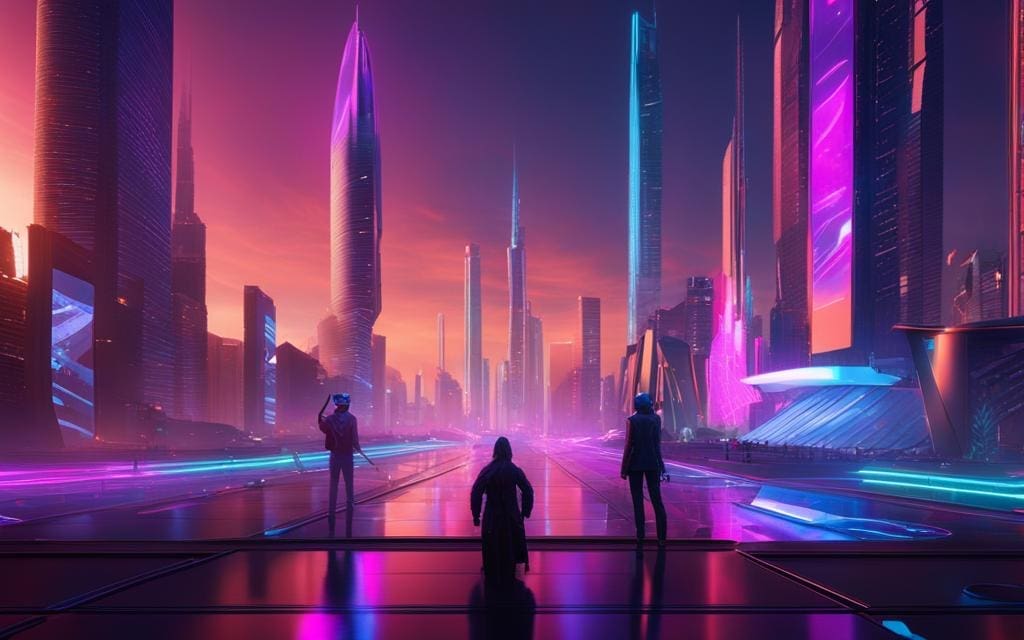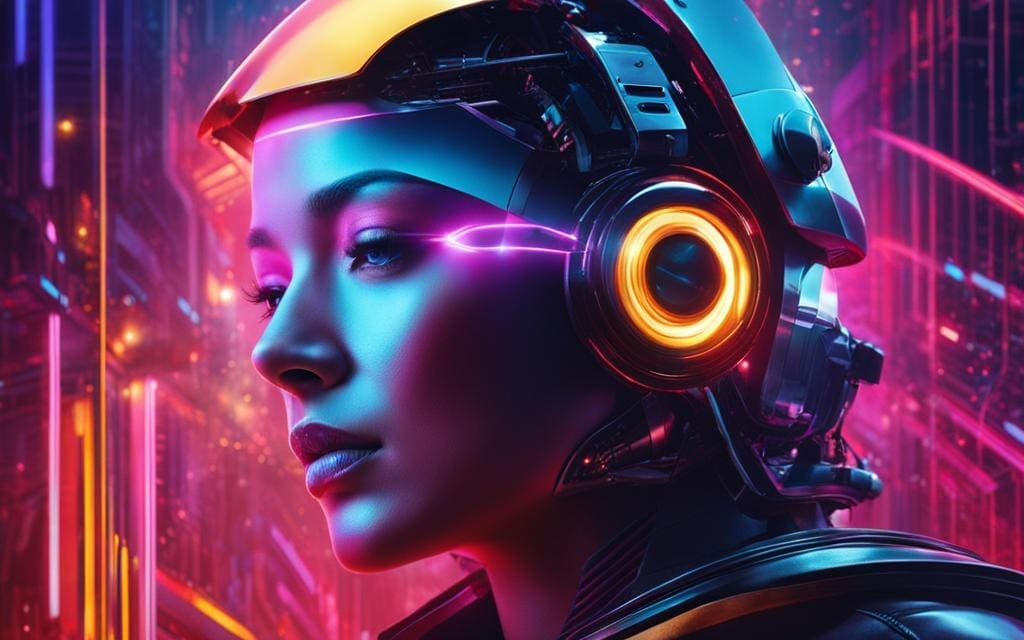Artificial Intelligence (AI) has revolutionized the film and music industries, pushing the boundaries of creativity and transforming the way content is produced and consumed. With the advent of AI algorithms and machine learning, technological advancements have paved the way for new possibilities in movie and music production. From automated content creation to AI-driven storytelling, the impact of AI on film and music is undeniable.
AI algorithms are now being used for music composition and film production, allowing creators to tap into the vast potential of AI-driven creativity. These algorithms analyze data and generate music that perfectly complements visuals and enhances the narrative, accelerating the post-production process and enabling experimentation with different musical styles and genres. The role of AI in film scoring has never been more prominent.
In the music industry, AI is reshaping the way music is created and curated. AI-generated music in games and advertisements creates immersive experiences, adapting in real-time to the player’s actions and delivering personalized soundtracks that align with the brand’s message. AI-powered music recommendation systems analyze user data to provide tailored content suggestions, enhancing user satisfaction and engagement.
The future of AI in film and music holds endless possibilities. As technology continues to advance, AI integration in virtual and augmented reality experiences, as well as the advent of 5G and streaming services, will revolutionize content delivery and further enhance audience engagement. Interactive and immersive experiences will become more prevalent, blurring the lines between reality and fiction.
Key Takeaways:
- AI algorithms have revolutionized film and music production, reshaping the way content is created and consumed.
- AI-driven music composition and film scoring offer new avenues for creativity and experimentation.
- AI-powered music in gaming and advertising creates immersive and personalized experiences.
- AI analytics optimize content distribution and enable data-driven decision-making.
- The future of AI in film and music holds exciting possibilities for virtual reality, 5G, and interactive experiences.
The Impact of AI on Film Scoring
The advancements in AI technology have had a transformative impact on the process of film scoring. In the past, composers would spend hours creating melodies and harmonies to evoke specific emotions in a scene. But with the introduction of AI algorithms, the film scoring process has become a lot more efficient and automated.
AI algorithms can now analyze visuals and dialogue in films to generate music that perfectly matches the mood and enhances the narrative. This automation has accelerated the post-production process and provided filmmakers with the ability to experiment with different musical styles and genres to find the perfect fit.
By leveraging AI-generated film scores, filmmakers can ensure that the music aligns seamlessly with the visuals, creating a more immersive and captivating experience for the audience. This AI-driven approach to music creation in films has opened up new possibilities and expanded the creative boundaries of storytelling.
With AI algorithms driving the film scoring process, filmmakers can save time and resources while exploring a wide range of musical options. The automation in film scoring not only streamlines the production process but also allows for greater experimentation and customization. Through the use of AI-generated film scores, filmmakers can enhance the emotional impact of their films and bring their creative visions to life.
| Benefits of AI in Film Scoring | Examples |
|---|---|
| 1. Automation and efficiency in the film scoring process | AI-powered film scoring platforms like Jukedeck and Amper Music |
| 2. Enhanced creativity and experimentation with different musical styles | Collaboration between composer Benoît Carré and AI system Flow Machines to create an AI-generated pop song |
| 3. Seamless integration of music with visuals to enhance storytelling | AI algorithms used in the film “Ex Machina” to generate a captivating and evocative score |
The impact of AI on film scoring is evident in both the creative process and the final product. As AI technology continues to evolve, we can expect further advancements in AI-driven music creation in films, leading to more immersive and emotionally resonant experiences for audiences.
AI in the Gaming Industry
Artificial Intelligence (AI) has made significant strides in the gaming industry, revolutionizing the way games are developed and experienced. One of the key areas where AI is making a powerful impact is in the realm of music. AI-generated music in games is creating adaptive soundtracks that dynamically respond to the player’s actions, resulting in a more immersive gaming experience.
Traditionally, game soundtracks were composed in a linear fashion, with predefined tracks looping throughout gameplay. However, with AI algorithms for game music, developers can now create dynamic and adaptive soundscapes that seamlessly adapt to the player’s progress and decisions. This dynamic music enhances the overall gaming experience, creating a sense of immersion and engagement.
Adaptive music in gaming utilizes AI-powered algorithms to analyze the player’s actions, emotions, and progress in real-time. The algorithm then generates music that aligns with the current gameplay, intensifying during action sequences and calming during exploration. This level of customization and responsiveness adds depth and emotional resonance to the gaming experience.
AI-powered Gaming Experiences
AI is not only transforming music in gaming but also enhancing other aspects of the gaming experience. AI algorithms can analyze player behavior and preferences to generate personalized challenges, improve non-player character (NPC) interactions, and create more realistic and intelligent enemies. This level of AI integration is pushing the boundaries of gaming, enabling developers to create more immersive, interactive, and intelligent virtual worlds.
| Advantages | Challenges |
|---|---|
| 1. Enhanced immersion and emotional impact | 1. Ethical considerations of AI in gaming |
| 2. Personalized gaming experiences | 2. Ensuring balance and fairness in AI-controlled gameplay |
| 3. Intelligent enemies and non-player characters | 3. Development and implementation costs |
| 4. Dynamic and adaptive gameplay | 4. Technical limitations of AI algorithms |
The advancements in AI technology in the gaming industry are opening up new possibilities for developers and players alike. With AI-generated music, adaptive soundtracks, and intelligent gameplay experiences, AI is transforming gaming into a more dynamic, personalized, and immersive form of entertainment. As AI continues to evolve, we can expect even more groundbreaking innovations that will shape the future of gaming.
AI in Advertising and Music Creation
The entertainment industry has seen a significant transformation with the integration of artificial intelligence (AI) in advertising and music creation. AI algorithms are now being used to generate music specifically tailored for advertisements, providing a cost-effective and efficient solution for brands to create unique soundtracks that align with their messaging. Advertisers can input parameters such as mood, tempo, and genre into AI systems, which quickly generate customized music that resonates with the target audience.
Additionally, AI-powered music recommendation systems play a vital role in enhancing the listener’s experience. These systems analyze user data, preferences, and listening habits to deliver personalized music suggestions. By understanding individual preferences, AI algorithms can curate playlists and recommend new artists or songs that align with the user’s tastes. This not only improves user satisfaction but also helps artists and music platforms reach their target audience more effectively.
Furthermore, AI-driven content analysis allows for the creation of data-driven advertising strategies. Advertisers can leverage AI technologies to analyze vast amounts of data, enabling them to make informed decisions about content distribution and target audience preferences. By understanding consumer behavior and trends, advertisers can optimize their campaigns, ensuring that their message reaches the right audience at the right time. Through AI analytics, the entertainment industry gains valuable insights, paving the way for more effective advertising strategies and increased content engagement.
| Benefits of AI in Advertising and Music Creation | Examples |
|---|---|
| 1. Cost-effective and efficient music creation for advertisements | AI-generated music for advertisements |
| 2. Personalized music recommendations based on user preferences | AI-powered music recommendation systems |
| 3. Data-driven advertising strategies | – |
In conclusion, AI has revolutionized the advertising and music creation process in the entertainment industry. It enables advertisers to create tailored soundtracks that align with their brand’s message while offering personalized music recommendations to listeners. With AI-driven content analysis, advertisers can make data-driven decisions, leading to more effective advertising strategies. As AI continues to advance, we can expect further advancements in AI-powered advertising and music creation, enhancing user experiences and revolutionizing the entertainment industry as a whole.
AI in Content Creation and Personalization
Artificial Intelligence (AI) is revolutionizing content creation and personalization in the film and music industries. With the help of AI algorithms, creators can analyze vast amounts of data to generate tailored content that resonates with specific audiences. Streaming platforms utilize AI-powered recommendation systems to deliver personalized content suggestions based on user preferences, enhancing user satisfaction and engagement.
AI-generated content, such as automated scripts and music, is becoming increasingly prevalent. These AI-generated scripts offer a cost-effective and efficient solution for content creators, allowing them to quickly generate unique storylines and narratives. Similarly, AI-powered music composition algorithms enable composers and musicians to experiment with different musical styles and genres, expanding the creative possibilities in music production.
Moreover, AI algorithms play a crucial role in content analysis, allowing filmmakers and music producers to gain insights into audience preferences and trends. By understanding the patterns and preferences of their target audience, creators can make data-driven decisions to optimize content distribution and reach a wider audience. AI analytics also help studios and networks understand consumer behavior, enabling them to monetize content more effectively and enhance overall business strategies.
Benefits of AI in the Entertainment Industry
AI has brought about numerous benefits in the entertainment industry, revolutionizing the way content is recommended, created, and consumed. One of the significant advantages of AI is its impact on content recommendation systems. By analyzing user data and preferences, AI algorithms can deliver personalized content suggestions that enhance user satisfaction and engagement. This level of personalization enables individuals to discover new movies, music, and games that align with their interests and preferences.
Another area where AI excels is content creation. AI-driven tools streamline production processes, allowing creators to experiment with new ideas and bring them to life more efficiently. For example, AI algorithms can generate scripts, compose music, and even create realistic animations. These capabilities expand creative possibilities and enable content creators to push boundaries in storytelling.
AI also plays a crucial role in analytics within the entertainment industry. By analyzing vast amounts of data, AI-powered analytics tools provide valuable insights and help studios and networks make data-driven decisions. These insights can inform content distribution strategies, marketing campaigns, and monetization efforts, optimizing the overall performance of the entertainment business.
Moreover, AI-enhanced user experiences are becoming increasingly prominent. AI algorithms can analyze user behavior and preferences to create more immersive and interactive experiences. Whether it’s adaptive soundtracks in games or personalized movie recommendations, AI enhances user engagement and satisfaction by tailoring the entertainment experience to individual preferences.
| Benefits of AI in the Entertainment Industry | Description |
|---|---|
| Personalized Content Recommendations | AI algorithms analyze user data to deliver tailored content suggestions, enhancing user satisfaction and engagement. |
| Streamlined Content Creation | AI-driven tools simplify production processes and enable creators to experiment with new ideas more efficiently. |
| Data-Driven Decision Making | AI-powered analytics provide valuable insights that inform content distribution, marketing, and monetization strategies. |
| Enhanced User Experiences | AI algorithms create more immersive and interactive experiences by tailoring content to individual preferences. |
Real-Life Examples of AI in Entertainment
Artificial Intelligence (AI) is making waves in the entertainment industry, revolutionizing various sectors including film, music, gaming, and advertising. Let’s take a look at some real-life examples of how AI is being used in these industries:
AI in the Film Industry
The film industry is leveraging AI to enhance various aspects of production. For example, Scriptbook, an AI-driven platform, analyzes scripts and predicts their success at the box office based on factors such as genre, dialogues, and characters. This technology helps studios make informed decisions on which scripts to greenlight and invest in.
AI is also being used to automate animation processes. Companies like DeepMotion and Ziva Dynamics utilize AI algorithms to create realistic and lifelike animations for characters and creatures in films. This technology saves time and resources while delivering high-quality visuals.
AI in the Music Industry
The music industry is embracing AI to enhance creativity and streamline music production. AIVA (Artificial Intelligence Virtual Artist) is an example of an AI-powered composer that can generate original music in various genres. This technology provides musicians and producers with endless possibilities for creating music that resonates with audiences.
LyricFind, an AI-based platform, uses natural language processing algorithms to analyze and categorize lyrics. This enables music streaming services to deliver accurate and relevant results when users search for specific songs or lyrics.
AI in the Gaming and Advertising Industries
In the gaming industry, AI is being used to create immersive and dynamic experiences. AI algorithms generate adaptive soundtracks based on real-time gameplay, creating a unique and engaging atmosphere for players. Additionally, AI-powered virtual environments enhance the visual and interactive aspects of gaming.
In the advertising industry, AI-generated music is being utilized to create personalized soundtracks for advertisements. Advertisers can input parameters such as mood, tempo, and genre, and AI algorithms will generate original music that aligns with their brand message.
These real-life examples demonstrate the transformative power of AI in the entertainment industry. From script analysis to music composition and personalized advertising, AI is pushing the boundaries of creativity and innovation.
Future Trends in the Entertainment Industry
The future of AI in the entertainment industry holds exciting possibilities. As technology continues to evolve, AI is expected to play a major role in transforming the way we experience and interact with entertainment content. Here are some key trends that we can expect to see in the future:
1. AI in Virtual Reality
The combination of AI and virtual reality (VR) will create even more immersive experiences for consumers. AI algorithms will enhance the realism of virtual environments, making them more interactive and engaging. From lifelike characters to dynamic and responsive landscapes, AI will revolutionize the way we perceive and interact with virtual worlds.
2. 5G and Streaming
The advent of 5G technology and the widespread availability of high-speed internet will significantly impact content delivery. Streaming services will become faster and more seamless, allowing for instant access to a wide range of entertainment options. With the integration of AI, streaming platforms will be able to provide personalized recommendations and create tailored experiences for individual users.
3. AI Integration in Entertainment
AI will continue to be integrated into various aspects of the entertainment industry. From content creation to audience engagement, AI algorithms will enhance the efficiency and effectiveness of different processes. We can expect to see more AI-driven tools and technologies that enable creators to experiment with new ideas and deliver personalized experiences to their audience.
4. Interactive and Immersive Experiences
One of the most significant trends in the future of AI in entertainment is the rise of interactive and immersive experiences. AI-powered technologies will allow users to engage with content in new and exciting ways. From interactive storytelling to augmented reality experiences, AI will blur the lines between reality and fiction, creating unforgettable and captivating experiences for audiences.
The future of AI in the entertainment industry is promising, with advancements in virtual reality, 5G, AI integration, and interactive experiences. As technology continues to evolve, we can expect AI to play an increasingly significant role in shaping the way we consume and engage with entertainment content.
Conclusion
As AI technology continues to advance, its role in the entertainment industry will only continue to grow. The impact of AI is already visible in various aspects, ranging from film scoring and gaming to advertising and content recommendation. With AI algorithms being used for music composition, film production, and personalized content suggestions, the entertainment industry is experiencing a significant transformation.
AI-driven automation and creativity are reshaping the way content is created and consumed. The ability of AI algorithms to analyze visuals, dialogue, and user data allows for personalized and adaptive experiences that enhance audience engagement. This not only improves user satisfaction but also optimizes production efficiency.
Looking ahead, the future of AI in entertainment holds exciting possibilities. The ongoing evolution of virtual reality (VR) and augmented reality (AR) technologies, along with the advent of 5G and streaming services, will further enhance immersive experiences and content delivery. AI integration will continue to drive innovation, enabling interactive and immersive experiences that blur the lines between reality and fiction.
With ongoing technological advancements, AI will play an even more significant role in the future of film and music. The possibilities are endless, and the entertainment industry will continue to evolve, creating new opportunities for creativity and audience engagement. Embracing the potential of AI in entertainment will undoubtedly shape the way we create and consume content in the years to come.




